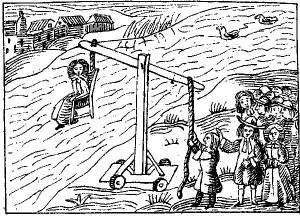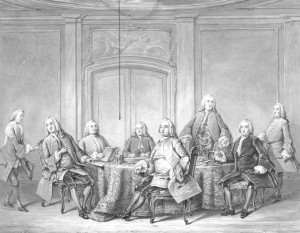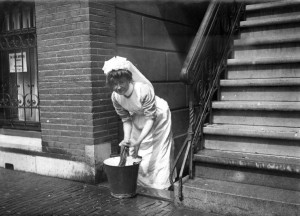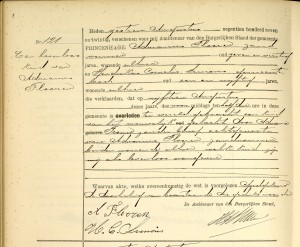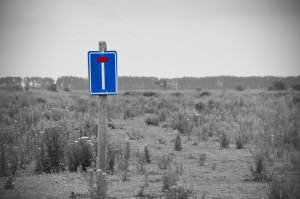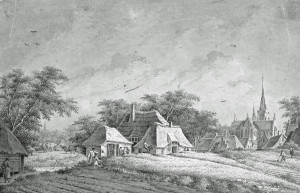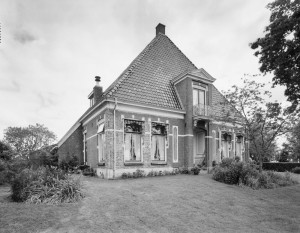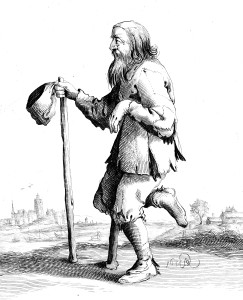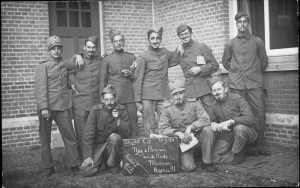A vonnis is a verdict by a court. You can find vonnissen in court records, which are mostly not available online. … [Read more...]
Dutch term – Heks
A heks is a witch. Witch trials were held in the Middle Ages and lasted until the 17th century. In modern Dutch, a heks is typically female, but in the past, the word was used for men as well. If you were accused of witchcraft, one defense would be that you were too heavy to fly on a broom. Since 1545, people could go to the heksenwaag (witches' scales) in Oudewater to be weighed and receive an official certificate if they were of normal weight. People from all over Western Europe came to … [Read more...]
Dutch term – Gilde
A gilde was a guild, an organization of people of the same occupation in a certain town or region. Guilds were since the Middle Ages and some of them continued to operate until around 1800, when the French made an end to their monopolies. Most guilds had rules about admittance and training. Apprentices or gezellen could only become full members (masters) after years of training and passing a master's test. Guilds were especially powerful in larger towns, where guilds held privileges which … [Read more...]
Dutch term – Dienstbode
A dienstbode was a domestic servant. Many dienstbodes lived with the families where they served. Because dienstbodes moved a lot, many municipalities started keeping seperate "dienstbodenregisters" [registers of domestic servants] as part of the population registration to keep track of who lived where. … [Read more...]
Dutch term – Overlijdensakte
An overlijdensakte is a death record. In most of the Netherlands, deaths have been recorded in death records of the civil registration since 1811. Before that, burial records kept by the churches are usually the best information available for finding out when someone died. Read more about death records. … [Read more...]
Dutch term – Doodloper
A doodloper (literally: dead walker) is a dead end, a term Dutch genealogists use for an ancestor for whom we haven't found the parents yet. They are the end points in your family tree. A doodloper is similar to the English term "brick wall ancestor," but subtly different. "Brick wall" is generally used for ancestors who are seemingly impossible to find, even after a lot of research has been done. A doodloper can simply be an ancestor for whom you haven't done much research yet; it's the end … [Read more...]
Source: Borgbrief (Bond letter)
Before the mid 1800s, if you wanted to move to a new place, you had to provide proof that you would not be a liability to the town. You would be required to submit a bond letter to the authorities, wherein the poor administration or civil authorities of your previous town declared that they would take care of you if you became poor. These letters were called "borgbrieven" [bond letters] or "akte van indemniteit" [record of indemnity] and can be a wonderful source of information about migration … [Read more...]
Dutch term – Proclamatieboek
In the province of Friesland, a proclamatieboek is a register in which the court records the proclamations of real estate sales that took place. This allowed people who had Naastingsrecht the opportunity to match the purchase price and buy the property for themselves. Proclamatieboeken can be found in the archives of the local courts, which are kept at the provincial archives of Friesland, Tresoar. The Friends of the Frisian Archives (Stichting FAF) have created indexes and abstracts of some … [Read more...]
Dutch term – Landloper
A landloper was literally a "land walker," a vagrant who roamed the countryside. Vagrancy used to be a crime, and vagrants could be incarcerated or banned. Some regions employed special "armenjagers" [pauper hunters] to drive them away. … [Read more...]
Dutch term – Loteling
A loteling was a conscripted soldier, whose number came up. This 19th century term literally means "lottery person," which refers to the lot numbers that were assigned to all eligible young men. The ones with the lowers numbers had to serve. Until 1896, you were allowed to switch numbers, and the person who had to serve in another's place would be called a nummerwisselaar. … [Read more...]

